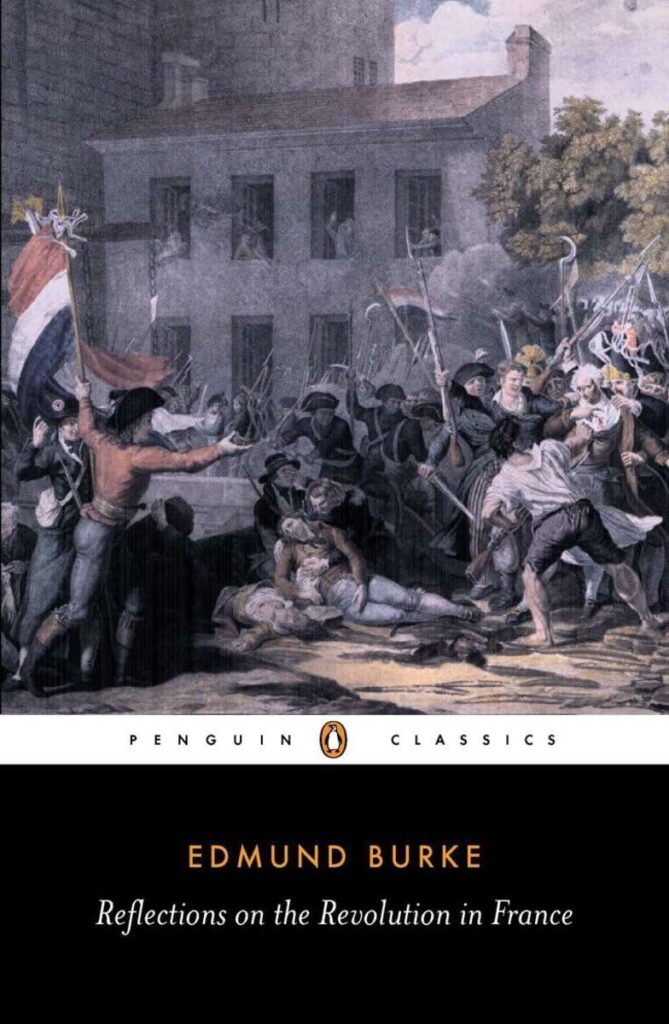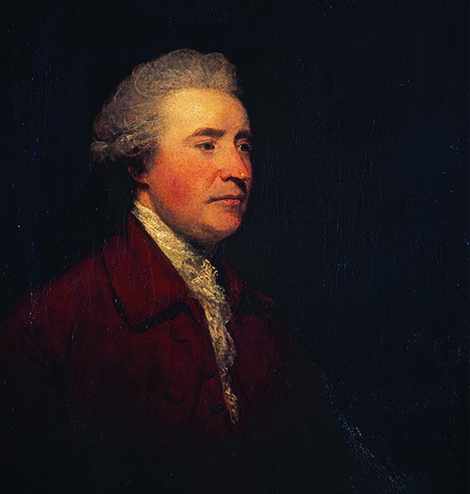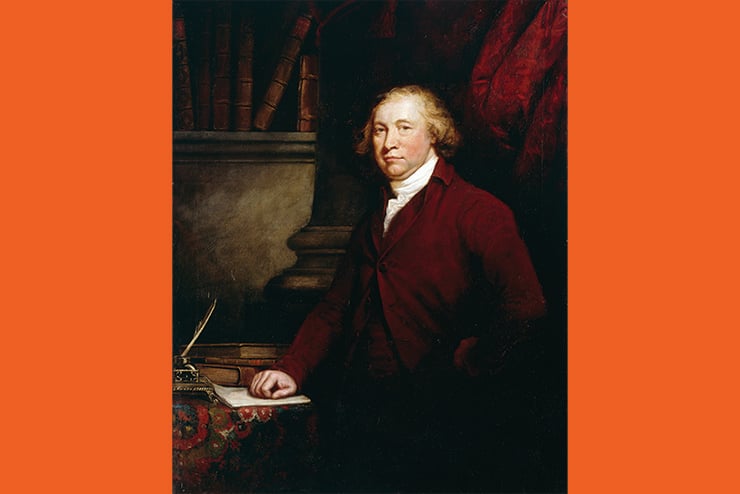Father of Modern Conservatism
Perhaps nothing shows the confused state of American conservatism so well as the fact that Edmund Burke is a controversial figure within it.
An often isolated, crusading figure for virtue and public spirit in late 18th-century Great Britain, Burke forged a coherent understanding of politics and the common good rightfully called “conservative.” He was among the first to see and oppose the murderous nature of French revolutionary Jacobinism, the movement that would spawn modern totalitarianism. He stood against the “armed atheism” of the Jacobins without abandoning his lifelong opposition to centralized power and corruption. Perhaps most famously, his commitment to ordered liberty led him to defend the American colonists in the disputes that ended in the War for Independence.
Burke’s tireless work on behalf of British constitutionalism extended to a variety of societies existing within the Empire, including the Irish and Indian as well as the American. He fought against the system of royal patronage that centralized power in the hands of the king but also against the depredations of the East India Company, which he saw as destroying the Indian subcontinent’s social order just as it also corrupted Britain’s Parliament. He fought for balanced, limited government in the service of a free, civil order rooted in history, tradition, and the character of the people.
Burke recognized in every society a variety of communities and relationships constituting the civil social order. He held that every person is capable of a dignified, meaningful life through participation in familial, religious, civic, and economic associations. These associations form every person’s character to a significant degree and relationships among them determine the peace or disorder of the commonwealth. In this view, the state is merely one aspect of the social order—one by nature intended to maintain peace among more fundamental institutions. Whether in the name of equality, fairness, or even philosophy, the state that seeks to re-order society, including to make it more supportive of philosophy or its putative fruits, tends to destroy the associations in which alone we may become decent.
Some explanation seems necessary as to why, in putatively conservative circles today, one risks being dismissed as a hopeless reactionary, an un-American Anglophile, or a dreamy romantic if one looks to Burke’s life and writings for guidance amidst the ruins of America’s constitutional republic. Such was not always the case.
Until recently, Burke was recognized from the time of the Revolution as an important defender of traditional liberties. His speeches in defense of the colonists were included in widely read collections of political rhetoric throughout the 19th century. Only in later times, as American conservatism coalesced into a political movement opposing progressivism and the entrenchment of New Deal ideology and institutions, did his work become controversial, especially on the right, where today he is little more than a source of wisdom for traditionalist or “cultural” conservatives.
Those seeking to minimize Burke’s place in American conservatism generally fall into one of two camps. First are liberals and libertarians seeking to reject in part a “foreign” influence alien to American individualism. This group’s membership is made up of both left- and right-wing individualists who insist that America was “exceptional” on account of its people’s commitment to individual autonomy, restless movement, and the pursuit of wealth. These observers reject Burke because they reject any understanding of America’s constitutional order as the outgrowth of English traditions of self-government and the experiences of particular communities of settlers.
The second group is heavily influenced by two kinds of followers of German political philosopher Leo Strauss. “East Coast Straussians” (also known as neoconservatives) stick closest to the writings of their founding master in condemning Burke for insisting on the role history and tradition play in forming the character of peoples. Strauss, an important critic in his home country of Nazi totalitarianism, was reacting to the idealism of continental thought and its vision of History as a grand actor in the life of nations. Thus, he misperceived the nature of Burkean traditionalism, particularly its emphasis on the plural nature of cultural life and the necessity of separated, limited power in politics for any reasonable attempt at securing the common good. He mistook Burke’s historically grounded commitment to natural law and pluralism for a “subjectivist” rejection of ontological realism, such as the anti-rational German nationalism that devolved into Nazism.
“West Coast Straussians,” on the other hand, are influenced by the interpretation of Strauss put forward by Harry Jaffa. They emphasize the necessity of abstract, ideological principles as laid down in the second paragraph of the Declaration of Independence as the basis for a kind of civil religion. Only commitment to this universal ideology, in their view, can guide people toward right action—meaning support for individual liberty and equality of opportunity as structured by political policy.
For both varieties of Straussians, Burke’s recognition of the central role played by particular traditions and circumstances in shaping the institutions, beliefs, and practices of different societies renders him an unreliable ally in their grand plans to base national power on the universal principles of individual rights and equality of opportunity.
Burke’s vision is quite distinct from that of his critics. It encompasses the Anglo-American tradition in which our constitutional order and the very character of our society are embedded. This is precisely what makes him conservative. He saw his own country’s liberties as an “entailed inheritance,” a growth from historical struggles that forged a tradition set down in documents like England’s Magna Carta and Bill of Rights and brought to life in the habits and character of the British. Likewise, in America, Burke saw a people devoted to local freedoms laid down in English precedents and established in their experience of living in small, frequently isolated settlements on the American frontier.
Burke’s emphasis on tradition, which Straussians and some others have deemed “historicist,” is, in fact, a
recognition of the need for virtue in political (as in all) life. As Burke put it, “Men are qualified for civil liberty in exact proportion to their disposition to put moral chains upon their own appetites…. Men of intemperate minds cannot be free. Their passions forge their fetters.” This is no call for tyranny but a call to virtue, one that has been ignored for so long in the United States that we have approached a time when it is not irrational to despair whether our people are capable of taking back their liberties from an overweening federal government and restoring America’s historic constitutional order.
Even the anti-Burkean individualists on the right seem capable of grasping the quandary America now finds itself in, but how should we address the problem? Ideological crusades have had quite limited success in recovering the capacity for self-government, especially when framed in a language of “equality” and “autonomy” that further erodes the ties that bind us to one another and to the institutions in which we learn to govern ourselves. Burke laid out the grounds of a self-governing patriotism thus:
To be attached to the subdivision, to love the little platoon we belong to in society, is the first principle (the germ, as it were) of public affections. It is the first link in the series by which we proceed towards a love to our country and to mankind.
Too often read as a mere requiem for the medieval village, Burke’s discussion of our “little platoons” in his Reflections on the Revolution in France (1790) is a penetrating analysis of what today passes for political psychology; it is a statement of human nature, of how we must live if we are to form the ties that alone produce functioning communities and the individual character necessary to a self-governing people.

Alexis de Tocqueville, that great 19th-century observer of American character, noted that American democracy worked only because local townships shaped Americans into decent neighbors capable of governing themselves together. Here, Tocqueville was merely spelling out in the American context what Burke had argued decades before—that it is only the experience of working with one’s neighbors to tend to the needs of one’s community (from the town that needs a new road to the church that needs a new steeple) that one develops the habits of cooperation and the pride of place necessary to fight off attempts by various bureaucrats, ideologues, and other power-hungry centralizers who would enslave us.
Burke was writing within Britain’s class society. The tradition he worked to conserve was dominated by aristocrats. But it was also a good society; it left room for men of talent to rise and for those in menial occupations to improve themselves. What is more, Burke constantly worked to redress abuses. For example, he criticized the “anti-popery” laws that oppressed Catholics. He also sketched a code for the British West Indies that sought to put slavery on the road to extinction by requiring that the real natural rights of all, most importantly family integrity and religious practice, were protected, whatever their impact on the economics of slavery. His central guiding principle was that culture, not ideology, was key to a people’s ordered liberty.
Yet when Burke has not been dismissed as a reactionary, he has been painted as a fainthearted conservative, more appropriate as a lodestar for the establishment conservative figures so practiced at whispering “a bit slower please” as mobs of radicals tear down Western civilization. The reasons for this misunderstanding of Burke lie in a mistaken notion about his call for prudence. Burke frequently called on this virtue in recommending measured, considered action, especially in foreign affairs.
For example, in arguing against rash hostility toward the Americans by an angry Parliament, he argued that “we might wish the colonists” were more willing to trust rulers in London, “but the question is not, whether their spirit deserves praise or blame” but what Parliament should do with it. Americans’ character was unruly, and Burke warned that Britain, if she wished to continue ruling the colonies, would have to prudently understand and shape their policies in accord with the American character.

But his frequent calls for prudence do not mean that a Burkean approach would be weak-willed and accommodating toward riots in our streets or drag queens in our schools. Indeed, a current American application of Burkean prudence would require aggressive opposition to the constant push for America to serve as world policeman. Burke saw no good for any nation in such a role, even for the then-dominant British Empire. Prudence dictates consideration of the real interests of the people the statesman serves rather than the hubris that breeds corruption or cowardice masquerading as principle.
Burke rejected half-measures to deal with those who would tear down civilization. Hence, he argued that a tepid response to the French Revolution would be fatal. He called for a “moral war,” a “Battle of Giants,” to defeat Jacobinism’s atheistic ideology, which hid its murderous hatred of mankind behind the empty slogan of “liberty, equality, fraternity.” Conservatives like the Straussians who champion such universal concepts would do well to remember that religious zeal for “equality of opportunity” or “freedom,” divorced from the communities in which the concrete liberties of self-rule are practiced, leads to the guillotine.
In his battle against the French Revolution, Burke fought an ideology sometimes supported even by those who think themselves conservative. He did so not because he hated liberty or sought dominance over others but because he recognized that order in our souls is the precondition for order in our commonwealth.
Traditional conservatives, some of whom at times seem to accept a defeatist attachment to mere forms of civility, have long championed Burke as a defender of customary ways of life. Perhaps we also should emphasize that he was a committed and vigorous opponent of tyranny and chaos. To quote him one last time: “All that is necessary for evil to triumph is for good men to do nothing.”

Leave a Reply